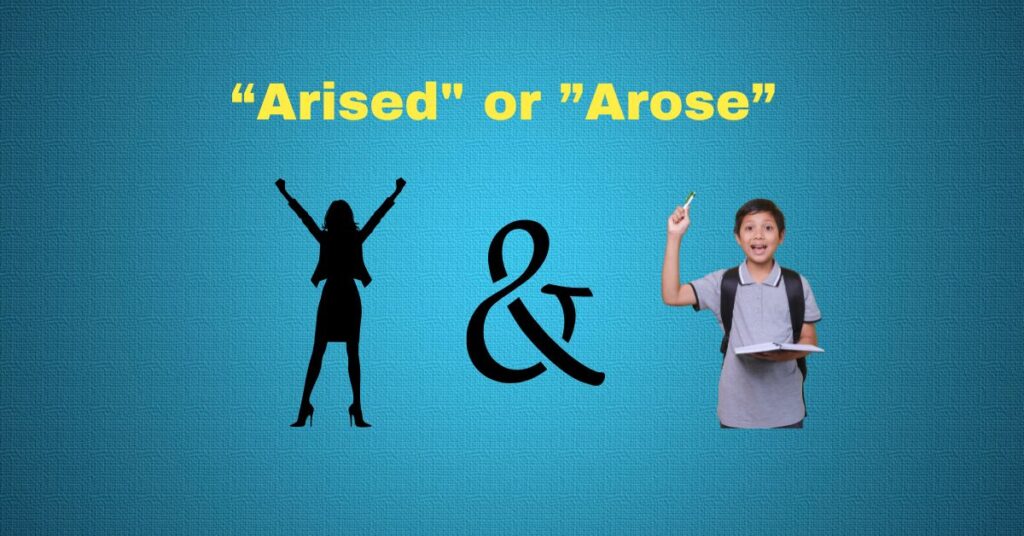Arised or Arose Correct Past Tense of Arise: English grammar can be tricky, especially when it comes to irregular verbs. One verb that often confuses people is arise. You might be familiar with the confusion between using arised and arose, but the correct form is more straightforward than it seems. Understanding the different tenses of arise—arose and arisen—is essential for both written and spoken communication. In this article, we will clarify the differences, show you how to use each form properly, and give you practical examples to help you avoid mistakes.
Definition
To get started, let’s define the verb arise clearly.
- Arise: To come into existence, to emerge, or to get up (from lying or sitting).
- Arose: The past tense of arise, used to indicate something that occurred in the past.
- Arisen: The past participle form, used with auxiliary verbs like have, has, or had, referring to something that has happened with continuing relevance.
These forms are irregular, which is why many people mistakenly use arised as the past tense. But don’t worry! We’ll help you remember the correct usage.
Meaning & Explanation
Let’s break down the usage of arise, arose, and arisen a bit further to make everything crystal clear:
- Arise (Present Tense):
Arise refers to something that’s happening right now, something emerging, or coming into view. It can also refer to getting up from a seated or lying position.
- Example: “New opportunities arise when least expected.”
- Arose (Past Tense):
Arose is used when something occurred in the past. It’s the correct form to use when you’re talking about events that have already happened.
- Example: “A problem arose during our project meeting.”
- Arisen (Past Participle):
The past participle arisen is used with auxiliary verbs like have, has, or had. This form highlights events that started in the past but are still relevant now or were completed in the past.
- Example: “New questions have arisen since the announcement.”
Let’s visualize this in a simple table for easier understanding:
| Verb Form | Tense | Example |
| Arise | Present | “Problems arise unexpectedly.” |
| Arose | Past | “An issue arose during the meeting.” |
| Arisen | Past Participle | “New challenges have arisen since then.” |
Examples & Usage
Now that we’ve covered the definitions and forms, let’s take a deeper dive into examples for each tense:
Arise (Present Tense)
- “Problems arise when expectations aren’t clear.”
- “Opportunities arise from challenging situations.”
- “Let’s see what arises in tomorrow’s discussion.”
Arose (Past Tense)
- “The issue of budget cuts arose during the last meeting.”
- “A great opportunity arose after the merger.”
- “A few challenges arose that delayed the project.”
Arisen (Past Participle)
- “New questions have arisen since the presentation.”
- “By the time I arrived, the problem had arisen.”
- “Several issues have arisen over time.”
The key takeaway here is that arose is used for past events, while arisen is used in conjunction with auxiliary verbs to indicate something that started in the past and continues to be relevant.
Types & Categories
The verb arise is straightforward, but its forms do change depending on the tense. Here’s a breakdown of the three forms and when to use each one:
| Verb Form | Tense | Usage |
| Arise | Present | Describes something happening now or in the future. |
| Arose | Past | Used when referring to something that happened in the past. |
| Arisen | Past Participle | Used with auxiliary verbs like have, has, or had to indicate a past event with ongoing relevance. |
Related Words & Synonyms
Expanding your vocabulary with synonyms for arise can help avoid repetition and make your writing more engaging. Here are some related words:
- Emerge
- Appear
- Surface
- Materialize
- Spring up
- Come up
- Develop
- Crop up
- Transpire
For example, instead of always using arise, you could say:
- Emerge: “New problems emerge when expectations aren’t clear.”
- Surface: “The issue finally surfaced after much discussion.”
- Spring up: “Opportunities tend to spring up unexpectedly.”
FAQ Section
Q1: Is “arised” a correct word?
A1: No, arised is not correct. The past tense of arise is arose. The form arised is a common mistake, but it should be avoided.
Q2: What is the past participle of arise?
A2: The past participle of arise is arisen. It’s used with auxiliary verbs like have or had.
- Example: “A lot of questions have arisen since the discussion.”
Q3: Can I use arose in place of arise?
A3: No, arose is the past tense. Use arose when talking about events that happened in the past, and use arise when referring to present or future events.
- Example: “A problem arose last week.” vs. “We hope the problem doesn’t arise again.”
Q4: When should I use arisen?
A4: Arisen is used with auxiliary verbs like have, has, or had. It refers to an event or issue that has happened but still has ongoing relevance.
- Example: “New concerns have arisen since the announcement.”
Q5: Why is it important to know the difference between arise, arose, and arisen?
A5: Understanding these forms ensures that you use the correct tense depending on when the event occurred, helping you speak and write clearly and correctly.
Conclusion
In summary, the past tense of arise is arose, and the past participle is arisen. The incorrect form arised should be avoided. Once you understand the distinctions between arise, arose, and arisen, you’ll be able to use these words confidently and correctly. Always remember:
| Verb | Correct Form | Incorrect Form |
| Arise | Present | Arised |
| Arose | Past | Arised |
| Arisen | Past Participle | Arised |
By using these forms correctly, you’ll enhance your writing and speaking, ensuring clarity and accuracy in your communication.
Traveler or Traveller Which Spelling Is Correct?






